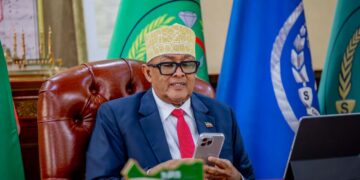Mogadishu, SOMALIA – Somalia’s Prime Minister Hamza Barre today announced a cabinet reshuffle, introducing several key changes to the government. The most notable appointments include Ahmed Moalim Fiqi, a member of the Daljir wing of President Hassan Sheikh’s party, as the Minister of Foreign Affairs; Ali Yusuf Ali “Hoosh,” a member of the Aran Jaan group that opposes President Deni of Puntland, as the Interior Minister; and Abdullahi Sheikh Ismail (Fartag) as the Internal Security Minister. Additionally, the government has appointed Abdullahi Bidhaan Warsame, an MP from Puntland (now part of the interim administration of SSC), as the Energy Minister. Meanwhile, Mohamed Adan and Ahmed Omar have assumed the roles of Telecommunications Minister and State Minister for the Environment, respectively.
Group Politics and Appointments
The reshuffle underlines the FGS’s intent to maintain a firm grip on internal dissent and regional disagreements. By appointing figures like Ali Yusuf Ali “Hoosh” and Abdullahi Bidhaan Warsame, who are central to the constitutional disputes and have direct opposition to Puntland’s leadership, the government not only showcases a hardline internal policy but also sends a strong message to regional entities resisting its authority. These strategic appointments reflect the government’s dedication to overriding opposition and steering Somalia’s political direction firmly from Mogadishu.
Hoosh’s involvement in the Aran Jaan group, which opposes President Deni of Puntland, has fueled suspicions about the Federal Government of Somalia’s (FGS) intentions towards Puntland. Some analysts view his appointment as an attempt by the central government to give the constitutional changes a veneer of inclusion while simultaneously influencing regional politics and maintaining its grip on power.
The selection of cabinet members based on their regional affiliations, political allegiances, and perceived ability to influence local politics, rather than their merit or commitment to national interests, has long been a contentious issue in Somalia. This latest reshuffle appears to reinforce these practices, potentially impacting the government’s ability to foster unity and work towards the common good of all Somalis.
With the appointment of Ahmed Moalim Fiqi as the Minister of Foreign Affairs, the Somali Federal Government (FGS) distinctly manifests its commitment to a robust policy stance toward regional power players like Ethiopia, and internally, towards Puntland and Somaliland. Fiqi’s assertive opposition to the Ethiopia-Somaliland Memorandum of Understanding (MoU) and his vocal advocacy for Somali unity exemplify the government’s strategy to confront regional influences perceived as threats. His role highlights the FGS’s determination to assert Somalia’s sovereignty and influence across complex regional dynamics. Specifically, Fiqi’s public denunciation of Ethiopia’s engagement with Somaliland and his support for the unionist sentiments in Awdal region underscore the broader geopolitical agenda of the Somali government, clearly aligning with its authoritative and unyielding approach.However, this approach may have implications for Somalia’s relationships with key regional partners and the already fragile peace in the Horn of Africa.
Puntland’s Resistance and the Quest for Inclusive Governance
The constitutional changes made on March 30, 2024, have been a major point of contention between the FGS and Puntland. Puntland officials have vehemently opposed these amendments, arguing that they undermine the principles of power-sharing and consensus that are essential for Somalia’s federal system. In response, the Puntland government has decided to act independently until Somalia establishes a government that adheres to the 2012 Constitution.
This decision by Puntland highlights the growing rift between the FGS and the semi-autonomous region. The appointment of individuals like Hoosh and Bidhaan by the FGS, who have been involved in controversial constitutional changes and have ties to groups opposing Puntland’s leadership, will deepen the mistrust between the two entities.
The cabinet reshuffle in Somalia has brought to the surface the complex interplay of group politics, regional dynamics, and the quest for inclusive governance that shape the country’s political landscape. As the FGS grapples with the fallout from the controversial constitutional changes, it also contends with the delicate regional relationships that have a direct bearing on Somalia’s stability and economic prospects.
The FGS’s current approach to governance, characterized by the appointment of individuals with strong regional affiliations and ties to specific political factions, has significant implications for the country’s future. By selecting cabinet members based on their ability to influence local politics and maintain the central government’s grip on power, the FGS risks further entrenching the divisions that have long plagued Somalia’s political landscape. This approach may exacerbate tensions between the FGS and regional stakeholders, such as Puntland, which have expressed their opposition to the controversial constitutional changes and the perceived lack of inclusive governance.
Navigating the Complex Political Landscape
The international community’s role in supporting Somalia’s efforts to build a more inclusive and representative political system is crucial. However, the effectiveness of this support will depend on the ability of international partners to strike a balance between providing targeted assistance and diplomatic support while respecting Somalia’s sovereignty and the need for Somali-led solutions to the country’s challenges.
As Somalia navigates this critical juncture in its history, the choices made by the FGS and other key stakeholders will shape the country’s trajectory. The cabinet reshuffle and the subsequent response from Puntland have highlighted the urgent need for a more inclusive and responsive governance model that takes into account the diverse interests and aspirations of all Somalis. The FGS’s ability to address these challenges and foster a spirit of unity and compromise will be essential for Somalia’s long-term stability and prosperity.







